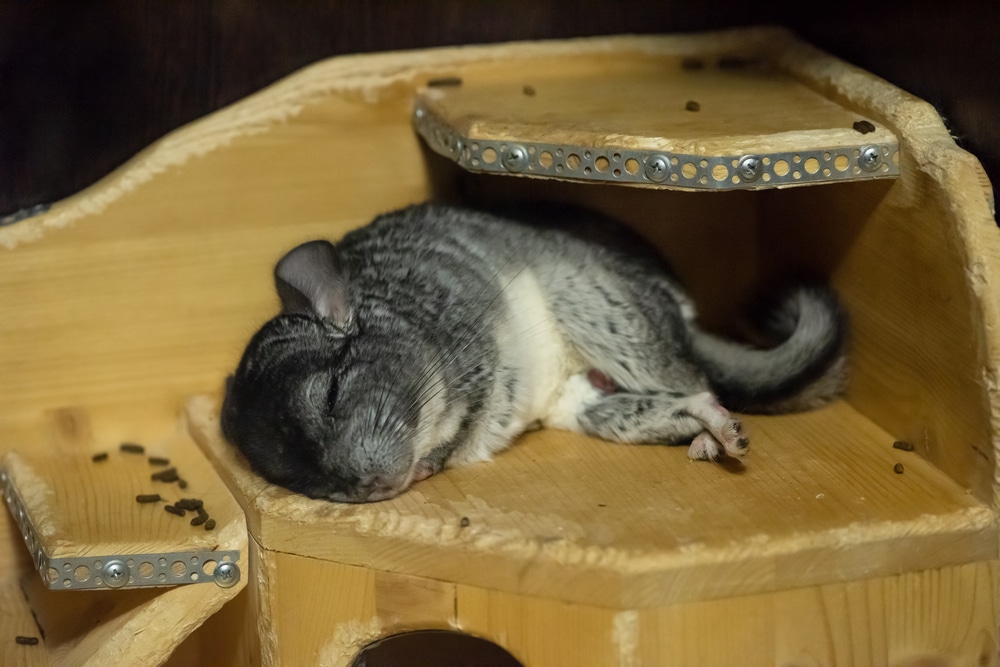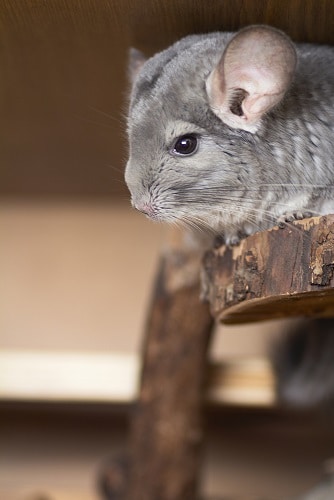
Chinchillas can be great pets, providing you with the company for over a decade. They have a lifespan of fifteen to twenty years, depending on how well you look after them.
With time your chinchilla may be showing symptoms that are essential to identify to know they are near the end of their lifespan.
Occasionally events take place that is beyond our control. Your chinchilla may become unwell and perhaps pass away too soon. We cannot stop them from dying.
Whatever the situation, we must provide maximum comfort till their last breath. If they’re suffering from a disease, it’s better to take them to a veterinarian before it worsens.
Knowing about the signs of death will help you better comfort your chinchilla in its last times. Continue reading to learn more about signs you’re chinchilla might be on a journey to heaven.
Chinchilla Dying Symptoms
Some chinchillas show symptoms before they die; if you are concerned about your chinchilla’s symptoms, you can learn whether it is showing dying symptoms.
Following are the dying symptoms of a chinchilla.
1. Loss Of Appetite
Poor health conditions may cause loss of appetite in your chinchilla, such as a tooth problem is a common cause of chinchillas not eating or drinking.
Chinchillas’ loss of appetite could also be because it doesn’t like the taste of water or the food you’ve provided or is not interested in ingesting liquid.
Food and water are essential for chinchillas, and they may become inactive and weak if they don’t eat enough.
These tiny animals are quick eaters, so when they slow down, it usually indicates a problem. Long-term malnutrition will finally result in a chinchilla’s demise.
2. Reduced Feces Production
You must have noticed how frequently chinchillas poop if you own one. You’ll eventually know if their feces production decreases.
Reduced feces production indicates that the chinchilla has a disease. They might have an intestinal obstruction or eat less than usual, indicating a possible illness.
3. Respiratory Infections
Respiratory infections are common in chinchillas, and it occurs cause of the temperature or the environment you keep your chinchilla. Difficulty in breathing and nasal discharge are the common symptoms of respiratory infection.
Your chinchilla will lose appetite, develop anorexia, and ultimately perish if this infection is not treated promptly.
To check if your chinchilla is losing weight due to improper nutrition, weigh them from time to time to get track of its weight.
4. Dental Problems
Dental problems are frequent in chinchillas and could be fatal. An enlarged tooth is more prone to infection. Always look for cracks in your chinchillas’ teeth.
Yellow or orange indicates healthy teeth; if their teeth have changed from the regular color, it is a problem. Dental problems may include drooling, appetite loss, or bald spots around the lips or eyes.
5. Lack Of Consumption Of Water
Less water intake could indicate that your chinchilla might get sick. You can check the water bottles attached to your chinchilla’s cage, which can be filled less often. It could signify that your chinchilla is not interested in drinking fluids.
Dehydration can lead to fatigue and inactivity, and your chinchilla may show signs of dark urine and skin tenting.
Lift your chinchilla and check if its shoulder and neck blades are springing back to normal position, and if it is irritated, these are dehydration symptoms. You should consult your veterinary to get your pet checked.
6. Skin And Fur Problems
Chinchillas have lovely, velvety fur, but certain disorders can drastically alter their appearance. Your chinchilla may develop bacterial, fungal, or ringworm illnesses if they get wet and stay moist for a long time.
Skin and fur illnesses irritate and create bald patches in your chinchilla. You can avoid these issues if you keep the cage correctly and make the necessary setup.
Keep the cage clean all the time and keep it at a suitable temperature. This will help in preventing these infections. It also helps to inspect their skin more frequently.
7. Heatstroke
The ideal setting for chinchillas is cold and dry. They struggle to survive in the heat and are likely to get serious health problems, including heat exhaustion and heat stroke.
They have a hard time cooling off because of their thick fur and lack of capacity to sweat. You must keep your chinchilla inside for these two reasons. These adorable animals deserve a relaxing area in your house.
8. Loneliness
Chinchillas are social animals, so showing them affection will go a long way. Since loneliness is not a disease, no medication can help treat it. While it won’t harm a chinchilla, it could change its usual food or socializing habits.
If you socialize with your chinchilla and feed it with your hands, it gets attached to you, and generosity and affection always have positive reactions on pets.
How To Handle These Symptoms?
You can handle your chinchilla with love and care and treat it well, examine its condition regularly and look for abnormalities or health problems.
Pre-check is better than getting the illness and making it worse, invest in your chinchilla and take it to the veterinary, and get it regularly checked.
Feed your chinchilla on time and make sure you don’t overfeed or underfeed it, their stomach and intestines are sensitive and are more prone to infections.
Bottom Line
Creating a bond with your chinchilla can take several months, and once it gets familiar to you, you realize how much you adore the animal and don’t want to part with it.
Seeing dying symptoms in your chinchilla could be painful, but you can feed it healthily to ensure it stays healthy.
Maintain its cage, keep it clean, and put it in a neat and cold environment. You should occasionally remove it from its cage to examine its body and schedule annual vet checkups.

